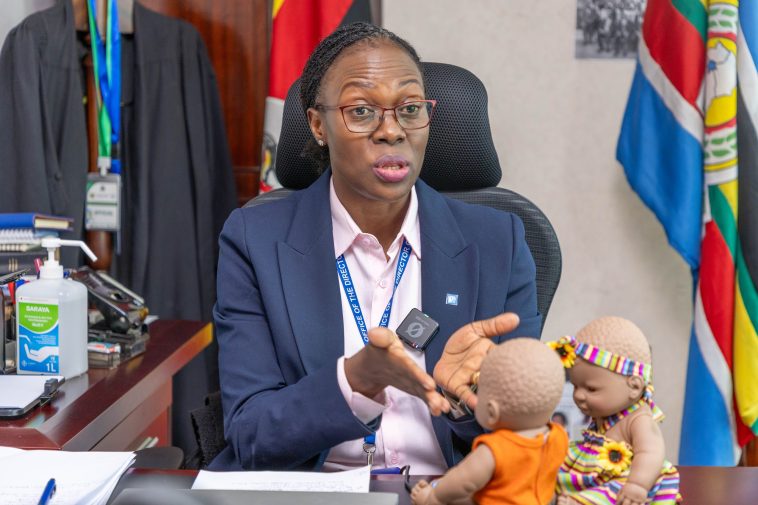For decades, Uganda has been transforming its juvenile justice system from punishment to protection, rehabilitation, and dignity. This journey began in the 1950s with the establishment of Naguru Remand Home and was strengthened by global frameworks such as the UN Convention on the Rights of the Child (1990) and the African Charter on the Rights and Welfare of the Child (1991). These shaped national reforms like the 1995 Constitution, which enshrines children’s rights and protections.
Uganda’s justice system has steadily evolved to prioritize the best interests of the child. The Justice for Children (J4C) initiative, supported by UNICEF, the EU, and JLOS, promotes child-friendly procedures that safeguard children’s rights and dignity. “Children shouldn’t be considered like adults because children are who they are,” says Brenda Patience Kyomugisha, National Coordinator of the program. Laws and practices now emphasize diversion, legal representation, timely hearings, and supportive services, ensuring that children in conflict with the law are treated fairly and given opportunities for rehabilitation and reintegration.
The introduction of the 2016 Diversion Guidelines by the Uganda Police has been a game-changer, allowing petty offenses to be resolved at the police or community level rather than through the formal court system. Today, 74% of eligible cases are diverted, giving children the chance to remain in their communities, continue school, and access counselling instead of facing detention. “Diversion has helped promote justice and protect children’s well-being,” says Detective SP Hakim Mukama, Kabale District CID Officer.
The Office of the Director of Public Prosecutions (ODPP) has also pioneered reforms that make justice accessible and sensitive to children’s needs. From the use of anatomical dolls to help survivors of sexual abuse share their stories, to informal courtroom settings where wigs and gowns are set aside, the justice process is becoming more humane. “When we are dealing with children, we’re not dealing with half-humans. They are full human beings with rights,” emphasizes Wakooli Samali, Assistant Director of Public Prosecutions and Head of the Gender, Children and Sexual Offenses Department. These reforms have contributed to conviction rates in sexual offense cases rising above 80%.
Across the country, child-friendly spaces have been established in ODPP offices and courts in Kampala, Masaka, Soroti, Mbale, and Fort Portal. These softly lit rooms with dolls, drawings, and comfortable chairs reduce trauma and help children express themselves freely. Officer Akumu Getrude at Masindi Central Police Station explains that gender desks ensure the child’s safety and privacy, and that female officers accompany girls to receive medical care, helping them feel safe, heard, and believed.
Courts have also begun gazetting specific days for child-related cases, reducing delays and stress while ensuring that trained probation officers and social workers are present. According to HW Nakitende Juliette, Assistant Registrar at Masindi High Court, this has made juvenile case handling more efficient and child-friendly.
Remand homes such as Naguru, Kabale, Masindi, and Hoima are no longer just holding centres but hubs of transformation. Children receive psychosocial support, vocational training, and life skills, leaving with DIT certificates in trades such as tailoring and agriculture. Some even return as tutors to inspire others. “I learned how to live with others and gained skills in agriculture,” says a former juvenile from Masindi Remand Home.
This progress is driven by collaboration among the Governance and Security Secretariat, Ministry of Gender, UNICEF, the EU, and other justice actors. Local successes in Iganga, Masindi, Mbarara, and Fort Portal show how communities, police, and welfare officers are working together to prioritize children’s best interests. ASP Kamiranga Margaret recalls that while the diversion approach initially faced misunderstanding, ongoing awareness and training have led to broader acceptance and stronger community support.
Legal aid officers, Mr. Kibulirani Nicholas of the Uganda Law Society also play a vital role, offering free legal representation and counselling to children who would otherwise face the system alone.
Yet challenges remain. Many districts still lack trained probation officers, remand homes face overcrowding and outdated infrastructure, and verifying children’s ages continues to be difficult—sometimes leading to minors being detained with adults. Limited funding and transport also hinder follow-up and reintegration efforts.
Still, Uganda’s vision remains clear: a justice system that protects rather than punishes. As Fred Ngabirano from the Ministry of Gender reminds, “Justice for children isn’t just about courts; it’s about every actor, from the village LC1 to the High Court, understanding their role and fulfilling it.”
The transformation of Uganda’s juvenile justice system shows what is possible when compassion, collaboration, and commitment come together. To sustain this progress, communities, leaders, and policymakers must continue to speak against corporal punishment, support diversion, and invest in child-friendly spaces. Every child deserves a chance to heal, learn, and thrive, not to be defined by their worst mistake.
Img: Ms Wakooli Samali, Assistant Director of Public Prosecutions and Head of the Gender, Children and Sexual Offenses Department.
This post was created with our nice and easy submission form. Create your post!






